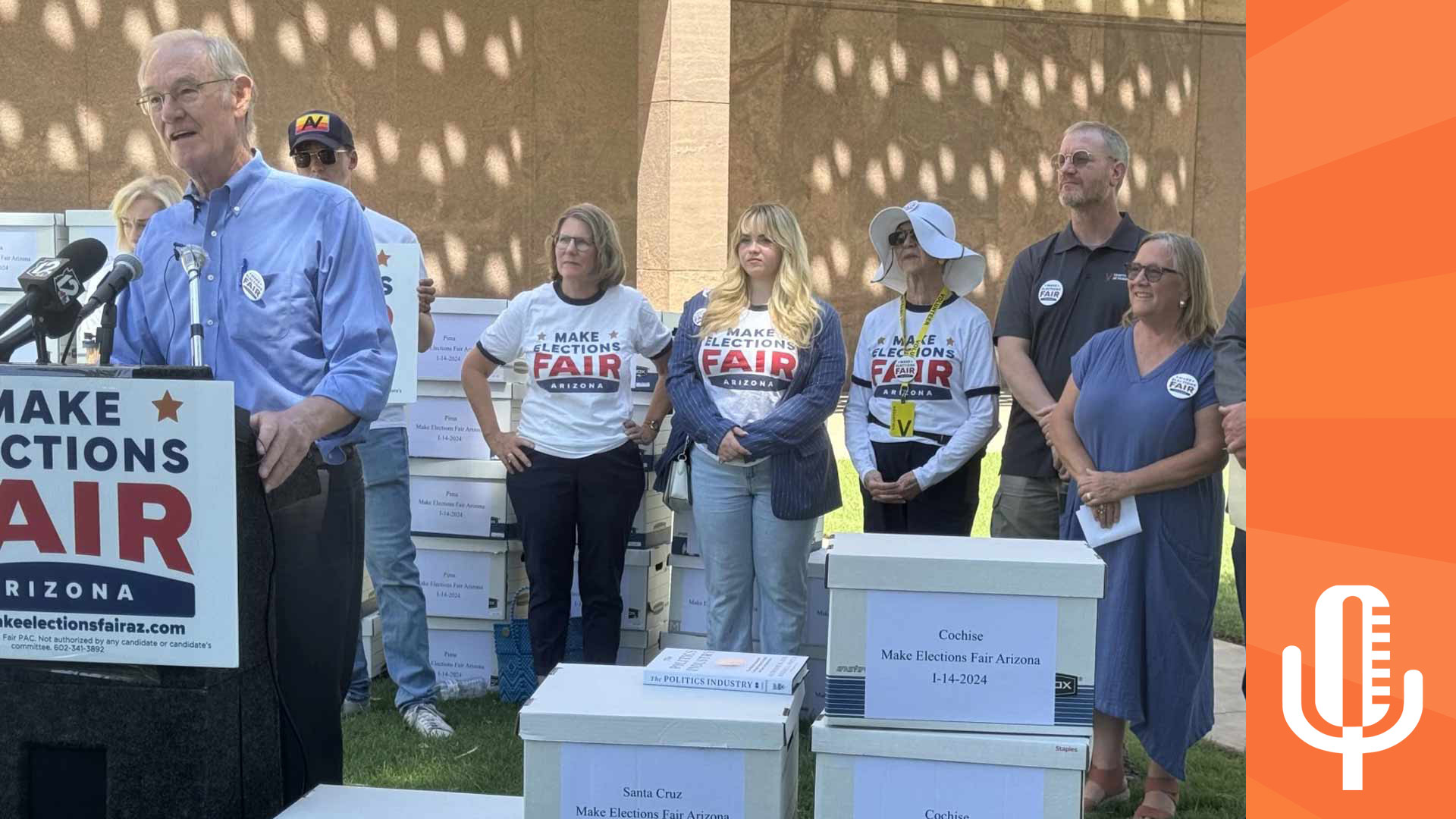 Former Arizona Attorney General and Phoenix Mayor Terry Goddard speaks surrounded by boxes of sheets with signatures that Make Elections Fair Arizona need to get their measure to qualify for the ballot at the state Capitol on Wednesday, July 3, 2024.
Former Arizona Attorney General and Phoenix Mayor Terry Goddard speaks surrounded by boxes of sheets with signatures that Make Elections Fair Arizona need to get their measure to qualify for the ballot at the state Capitol on Wednesday, July 3, 2024.
The Buzz for October 4, 2024

Arizonans will weigh competing ballot initiatives this year that could have a major impact on how the state handles its primary elections.
Proposition 140, which was put on the ballot after the group Make Elections Fair AZ gathered sufficient signatures, would make a slew of changes to our summertime elections.
It would allow all eligible voters to vote for any primary election candidate regardless of political party, impose the same signature requirements on all candidates seeking to make the ballot for a given office, generally prohibit the use of public funds for political party elections, allow future lawmakers to determine how many candidates advance from the primary election, and specifies that ranked-choice voting would be used should the legislature ever expand the general election beyond two candidates for each open seat.
Proposition 133, which was put on the ballot by state lawmakers, would do the opposite. It would enshrine the state's current party-based primary system in the Arizona Constitution, and disallow the use of open primaries in city elections.
"The key is, if you want better outcomes, we have to find a way to talk to people," said Paul Johnson, a former mayor of Phoenix who is a part of Make Elections Fair AZ. "We have to find a way to talk to people that we don't necessarily agree with, and that's what this initiative really does. It helps build bridges between these divides that we have in our country and in our state."
AZPM reached out to representatives for all of the sponsors and co-sponsors on the bill that put Proposition 133 on the ballot, as well as the Arizona and Maricopa Republican parties, and the Arizona Free Enterprise Club–which sponsored many of the anti-Prop 140 messages in the Arizona voter information pamphlet. They all either declined our request for interviews or did not respond.
The group that did agree to an interview is the Pima County Republican Party.
"This is basically amending the verbiage in the Arizona Constitution to make it very clear that primary elections will be direct primary elections conducted by the political parties," said Steve Selvy, the Pima County GOP's secretary. "So what's the difference? Part of what direct party primary elections mean is the party is basically responsible, the political party, for conducting its own primary. So what that means is that they are responsible for vetting candidates that run under the party banner."
Johnson disagrees.
"It's not meddling in the other party's affairs, this is the public's affairs, it's our affairs," he said. "The issues and the public policy and having a government that is extremely divided and people being unwilling to talk to one another that's not about their party. And by the way, it's not about one party over. This is about what kind of system do we want?" he said.
Selvy points out that both of the state's political parties oppose Proposition 140, though they are split on Proposition 133.
"It's my understanding that both the Arizona Republican Party and Democrat Party joined in on a lawsuit opposing Proposition 140, he said. "I can't speak for the Democrat Party, I don't know where they officially stand, but they both joined in on the lawsuit employees opposing it, so I'm guessing that the parties are not in favor of that because basically the motivation behind that, I think, is to eliminate the political parties."
A focus for both sides has been making the case using other states that made the switch to open primaries.
Johnson said he spoke with the majority leader of the Alaska Senate on his podcast. She switched from opposing the system to agreeing with it, noting that it didn't change the political party makeup of the legislature.
"The difference is, under the old system, these were the top three issues: election denial, abortion–people on either side, who uses what bathrooms," Johnson said. "She said the three big issues after this passed have become transportation, education, and economic development. It's because there's not an incentive to be promoting those issues that are the most divisive."
Selvy points out that Alaska will see a repeal of the law on its ballot this year. That matter was put to voters through a rule that goes through the legislature and requires fewer citizen signatures. He also points to the most recent US Senate race in that state.
"It was shown that what happened in Alaska with Lisa Murkowski versus Sarah Palin was–and that was using the ranked-choice voting process as well–it was shown later that Democrats crossed over and voted for what they considered to be the more moderate Republican, so they impacted that race," Selvy said.




By submitting your comments, you hereby give AZPM the right to post your comments and potentially use them in any other form of media operated by this institution.